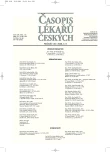-
Medical journals
- Career
Cross-national Comparison of Drug Compliance and Non-compliance Associated factors in the Elderly with Polypharmacotherapy
Authors: E. Topinková 1,2; D. Fialová 1,3; G. I. Carpenter 4; R. Bernabei 5
Authors‘ workplace: Geriatrická klinika 1. LF UK a VFN, Praha 1; Subkatedra gerontologie a geriatrie IPVZ, Praha 2; Katedra sociální a klinické farmacie FaF UK, Hradec Králové 3; Centre for Health Services Studies, University of Kent, Kent, Spojené království 4; Dipartimento di Scienze Gerontologiche, Universita Cattolica Sacro Cuore, Roma, Itálie 5
Published in: Čas. Lék. čes. 2006; 145: 726-732
Category: Original Article
Overview
Background.
Population of seniors in the Czech Republic consumes more than 35 % of all prescribed medications. Currently, Czech seniors take on the average 4–5 prescribed drugs. However, our knowledge about factors influencing drug compliance is scarce particularly in seniors with polypharmacotherapy. Non-compliance can contribute to treatment failure and increases the risk of adverse drug reactions. The aim of the study is to compare drug compliance in the elderly in 11 European countries and to assess the impact of demographic and drug-related factors on noncompliance to medication.Methods and Results.
Cross-sectional comparative study in 3881 elderly subjects living in the community receiving home-care services in 11 European countries participating in ADHOC (Aged in Home Care) study. In the sample of Czech subjects we performed in-depth analysis of causes and factors associated with non-compliance in patients with polypharmacotherapy. 12.5% (n=456) of European seniors were non-compliant with prescribed medication with significantly higher prevalence of non-compliance in the CR (33.5 %) and Germany (17.0 %). In the Czech sample following non-compliance risk factors have been identified: taking >7 drugs per os (OR= 2.2), 10 single applications/day (OR= 2.5), more than twice daily dosing (OR= 2.4), problems with drug preparation (OR= 4.6), polypharmacotherapy 5 years and longer (OR= 5.5) and drug preparation without supervision or help (OR= 2.8). The highest prevalence of non-compliance was found for antidepressants (80 %), antiasthmatics (68 %), fibrates (60 %), nonsteroidal antiinflammatory drugs, vasodilatators, anticoagulants/antiplatelet drugs and nootropics (50 %). Among the most common causes, patients reported forgetting to take the drug (74.3 % patients), mistrust in drug effect (10.6%) and fear of taking „too many drugs“ (8.6 %).Conclusions.
Non-compliance to prescribed drug regimen is a prevalent problem in one third of the Czech seniors and was found to be the highest among 11 European countries. Doctors prescribing to older people have to monitor purposefully compliance and strenghten co-operation and motivation of the patient to adhere with prescribed drug regimen. Particularly in seniors with polypharmacotherapy it seems necessary to simplify drug regimen as much as possible. In elderly patients with physical disability, cognitive impairment or depression supervision and/or help of another person with drug preparation and application may improve drug compliance.Key words:
aged, compliance, polyfarmacotherapy, non-compliance associated factors.
Labels
Addictology Allergology and clinical immunology Angiology Audiology Clinical biochemistry Dermatology & STDs Paediatric gastroenterology Paediatric surgery Paediatric cardiology Paediatric neurology Paediatric ENT Paediatric psychiatry Paediatric rheumatology Diabetology Pharmacy Vascular surgery Pain management Dental Hygienist
Article was published inJournal of Czech Physicians

-
All articles in this issue
- Drug Consumption and Risks of Polypharmacotherapy in Elderly Population
- Density Expression of the CD20 Antigen on Population of Tumor Cells in Patients with Chronic Lymphoproliferative Diseases
- Surgical Treatment of Infective Endocarditis: 8 Year Experience
- Cross-national Comparison of Drug Compliance and Non-compliance Associated factors in the Elderly with Polypharmacotherapy
- Effectiveness of Teaching Gerontology and Geriatrics in Students of the 1st Faculty of Medicine, Charles University in Prague
- Tuberculosis in the Czech Republic in 2005
- Spirituality in Medicine and Addictive Diseases
- Clinical Pastoral Care and Its Providers
- Scale for Tobacco Evaluation in Different Countries
- History of the Czech Gerontology and Geriatrics
- What is the Future of Our Genome?
- Biological Mechanisms of Aging
- Cardiovascular Diseases and Gene Polymorphisms
- Vacuum Assisted Closure Therapy – Overview of Lesson and Applications
- Journal of Czech Physicians
- Journal archive
- Current issue
- Online only
- About the journal
Most read in this issue- Vacuum Assisted Closure Therapy – Overview of Lesson and Applications
- Surgical Treatment of Infective Endocarditis: 8 Year Experience
- History of the Czech Gerontology and Geriatrics
- Biological Mechanisms of Aging
Login#ADS_BOTTOM_SCRIPTS#Forgotten passwordEnter the email address that you registered with. We will send you instructions on how to set a new password.
- Career

